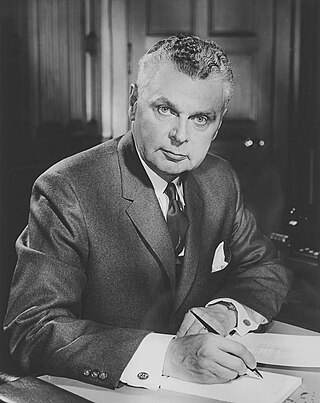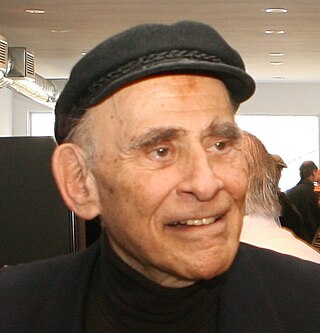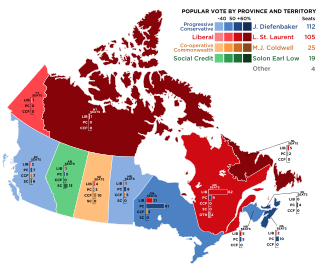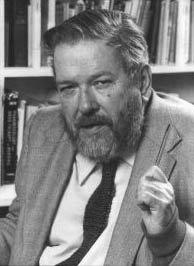
John George Diefenbaker was the 13th prime minister of Canada, serving from 1957 to 1963. He was the only Progressive Conservative party leader between 1930 and 1979 to lead the party to an election victory, doing so three times, although only once with a majority of the seats in the House of Commons.
Right-wing politics is the range of political ideologies that view certain social orders and hierarchies as inevitable, natural, normal, or desirable, typically supporting this position based on natural law, economics, authority, property or tradition. Hierarchy and inequality may be seen as natural results of traditional social differences or competition in market economies.

The Progressive Conservative Party of Canada was a centre to centre-right federal political party in Canada that existed from 1942 to 2003.
A Red Tory is an adherent of a centre-right or paternalistic-conservative political philosophy derived from the Tory tradition, most predominantly in Canada but also in the United Kingdom where it is more commonly known as one nation conservatism. This philosophy tends to favour communitarian social policies, while maintaining a degree of fiscal discipline and a respect of social and political order. It is contrasted with "Blue Tory" or "High Tory". Some Red Tories view themselves as small-c conservatives.
The National Policy was a Canadian economic program introduced by John A. Macdonald's Conservative Party in 1876. After Macdonald led the Conservatives to victory in the 1878 Canadian federal election, he began implementing his policy in 1879. The protective policy had shown positive responses in the economy with new industries flourishing Canada's economy in the 1880s. John A. Macdonald combined three elements as a strategy for the post-Confederation economy. First, by calling for high tariffs on imported manufactured items to protect the manufacturing industry. Second, by calling for a massive expansion of physical infrastructure, such as roads and railroads. Finally, enabled and supported by the former two, by promoting population growth, particularly in western Canada. The building of the Canadian Pacific Railway, and the fostering of immigration to Western Canada. Macdonald campaigned on the policy in the 1878 election, and defeated the Liberal Party, which supported free trade. It lasted from 1879 until sometime in the early 1950s.

Peter Charles Newman was a Canadian journalist, editor and author. He interviewed and wrote about every Canadian prime minister from Louis St. Laurent (1948–1957) to Paul Martin (2003–2006). His three-volume series on The Canadian Establishment helped set new standards for business reporting, while his three-volume history of the Hudson's Bay Company provided a comprehensive account of Canada's early beginnings as an international fur-trading nation.

The 1957 Canadian federal election was held June 10, 1957, to select the 265 members of the House of Commons of Canada of the 23rd Parliament of Canada. In one of the greatest upsets in Canadian political history, the Progressive Conservative Party, led by John Diefenbaker, brought an end to 22 years of Liberal rule, as the Tories were able to form a minority government despite losing the popular vote to the Liberals.

George Parkin Grant was a Canadian philosopher, university professor and social critic. He is known for his Canadian nationalism, a political conservatism that affirms the values of community, equality and justice and his critical, philosophical analysis of the social and political effects of limitless technological progress. As a practising Christian, Grant conceived of time as the moving image of an eternal order illuminated by love.

Howard Charles Green, was a Canadian federal politician.

William Kymlicka is a Canadian political philosopher best known for his work on multiculturalism and animal ethics. He is currently Professor of Philosophy and Canada Research Chair in Political Philosophy at Queen's University at Kingston, and Recurrent Visiting Professor in the Nationalism Studies program at the Central European University in Budapest, Hungary. For over 20 years, he has lived a vegan lifestyle, and he is married to the Canadian author and animal rights activist Sue Donaldson.

Canadian nationalism seeks to promote the unity, independence, and well-being of Canada and the Canadian people. Canadian nationalism has been a significant political force since the 19th century and has typically manifested itself as seeking to advance Canada's independence from influence of the United Kingdom and the United States. Since the 1960s, most proponents of Canadian nationalism have advocated a civic nationalism due to Canada's cultural diversity that specifically has sought to equalize citizenship, especially for Québécois and French-speaking Canadians, who historically faced cultural and economic discrimination and assimilationist pressure from English Canadian-dominated governments. Canadian nationalism became an important issue during the 1988 Canadian federal election that focused on the then-proposed Canada–United States Free Trade Agreement, with Canadian nationalists opposing the agreement – saying that the agreement would lead to inevitable complete assimilation and domination of Canada by the United States. During the 1995 Quebec referendum on sovereignty that sought to determine whether Quebec would become a sovereign state or whether it would remain in Canada, Canadian nationalists and federalists supported the "no" side while Quebec nationalists largely supported the "yes" side, resulting in a razor-thin majority in favour of the "no" side that supported Quebec remaining in Canada.
Centre-right politics lean to the right of the political spectrum, but are closer to the centre. Parties of the centre-right generally support liberal democracy, capitalism, the market economy, private property rights, and a modest welfare state. They support conservatism and economic liberalism and oppose socialism and communism.
Crawford Brough Macpherson was an influential Canadian political scientist who taught political theory at the University of Toronto.

Canadianism or Canadian patriotism refers to a patriotism involving cultural attachment of Canadians to Canada as their homeland. It has been identified as related, though in some cases distinct, to Canadian nationalism. In contemporary times, this patriotism has commonly emphasized Canada as a multicultural cosmopolitan society.
Liberalism is a political and moral philosophy based on the rights of the individual, liberty, consent of the governed, political equality, right to private property and equality before the law. Liberals espouse various views depending on their understanding of these principles but generally support private property, market economies, individual rights, liberal democracy, secularism, rule of law, economic and political freedom, freedom of speech, freedom of the press, freedom of assembly, and freedom of religion, constitutional government and privacy rights. Liberalism is frequently cited as the dominant ideology of modern history.
Liberalism, the belief in freedom, equality, democracy and human rights, is historically associated with thinkers such as John Locke and Montesquieu, and with constitutionally limiting the power of the monarch, affirming parliamentary supremacy, passing the Bill of Rights and establishing the principle of "consent of the governed". The 1776 Declaration of Independence of the United States founded the nascent republic on liberal principles without the encumbrance of hereditary aristocracy—the declaration stated that "all men are created equal and endowed by their creator with certain unalienable rights, among these life, liberty, and the pursuit of happiness". A few years later, the French Revolution overthrew the hereditary aristocracy, with the slogan "liberty, equality, fraternity" and was the first state in history to grant universal male suffrage. The Declaration of the Rights of Man and of the Citizen, first codified in 1789 in France, is a foundational document of both liberalism and human rights, itself based on the U.S. Declaration of Independence written in 1776. The intellectual progress of the Enlightenment, which questioned old traditions about societies and governments, eventually coalesced into powerful revolutionary movements that toppled what the French called the Ancien Régime, the belief in absolute monarchy and established religion, especially in Europe, Latin America and North America.

Death of the Liberal Class is a 2010 book by the American journalist Chris Hedges. Hedges writes on left-wing politics in the United States, and asserts the decline of a privileged and increasingly ineffectual "liberal class" due to corporate political dominance.

Maurizio Lazzarato is an Italian sociologist and philosopher, residing in Paris, France. In the 1970s, he was an activist in the workers' movement in Italy. Lazzarato was a founding member of the editorial board of the journal Multitudes. He is a researcher at Matisse/CNRS, Pantheon-Sorbonne University, and a member of the International College of Philosophy in Paris.










